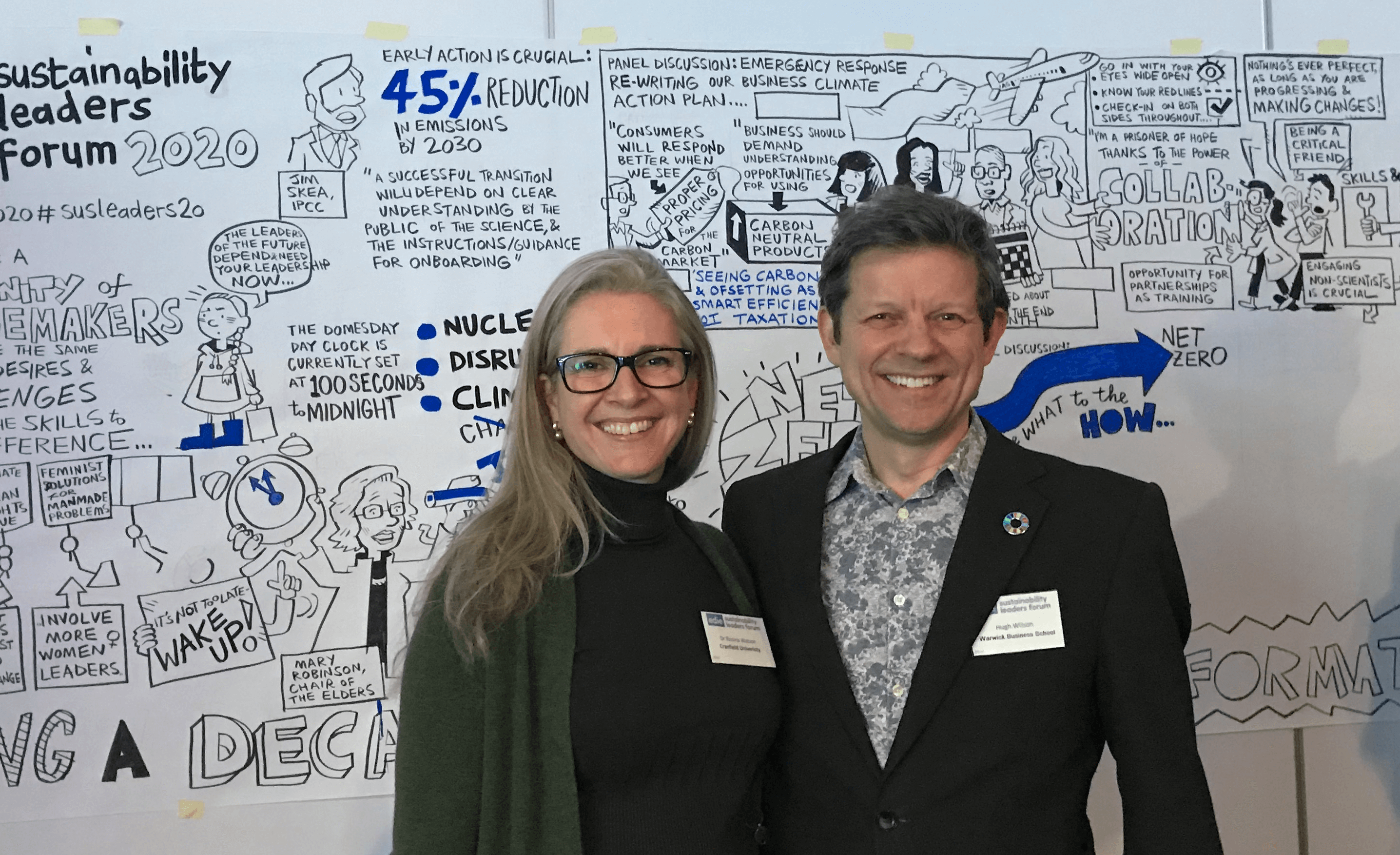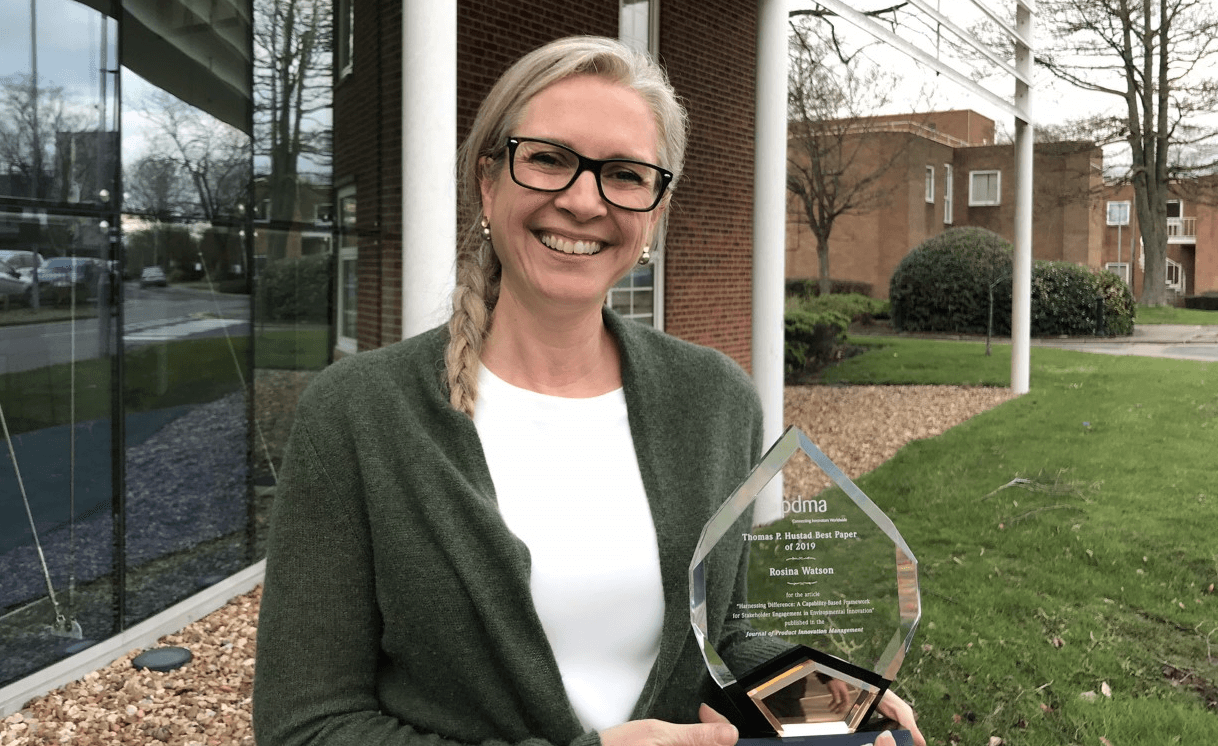Corporate sustainability is about developing a responsible long-term business strategy focused on ethical, environmental, social, cultural, and economic operations within a company.
Programs such as the Master’s in Management and Corporate Sustainability offered at Cranfield School of Management are designed with this future business model in mind.
As Cranfield’s senior lecturer in sustainability, Dr. Rosina Watson explains, with increased pressure being placed on businesses to promote corporate sustainability, there is far more demand for innovative businesspeople to help drive these changes.
“The scope of sustainability issues often exists outside conventional business boundaries; I’m working to teach students how to work collaboratively in sustainability,” she says.
As former head of corporate sustainability at Home Retail Group (Argos and Homebase), Rosina is able to use her firsthand experience of corporate sustainability to arm her students with the practical and theoretical understanding of what it takes to push a traditional business model into the sustainable sphere.
Here’s what you can learn from an MSc in Management and Corporate Sustainability.
 Dr Rosina Watson and former Management and Corporate Sustainability MSc Course Director Prof. Hugh Wilson at the 2020 Edie Conference
Dr Rosina Watson and former Management and Corporate Sustainability MSc Course Director Prof. Hugh Wilson at the 2020 Edie Conference
Adaptability
Businesses are always going to be vulnerable to big global changes, so having the ability to consider your long-term strategy is vital.
We’re seeing that vulnerability today through the market volatility caused by Covid-19––industries such as hospitality, tourism, and sports are having to innovate and diversify their offerings in order to stay open. It’s a sink or swim scenario: you adapt, or you drown.
Navigating times of crisis within any business or industry is a big part of the master’s curriculum, Rosina says.
“The core of the MSc revolves around learning the fundamental building blocks of running a modern-day, sustainable business. How do you run a business when working through the sustainability lens? How do you integrate sustainability into the core of your strategy? How do you engage your customers and suppliers with the topic?”
Rosina runs the Leading Corporate Sustainability module on Cranfield’s MSc program, which informs students of the major obstacles currently slowing sustainable innovation in businesses, and teaches them how to best approach implementing change.
“Specializing in business sustainability doesn’t limit your options,” she adds. “It will help you become one of the people innovating traditional industries.”
The lessons learned can be applied across industries, and this is reflected in the wide array of corporations Cranfield graduates have gone on to work for, including Coca-Cola Enterprises, Heineken, and USB Asset Management.
Interconnectivity
One of the most important lessons you’ll take away from the master’s is the ability to work with other businesses––both within your industry and outside of it––to promote change.
“Sustainability in business is really going to require the ability to develop an outward perspective––as opposed to just focusing on internal responsibilities in business,” Rosina explains. “You need to think about the context within which your business operates.”
To show students what this might look like, Rosina has students play a sustainability board game, in which they all represent different roles; for example, a traditional business, an entrepreneur, a policymaker and a charity.
“They play out different scenarios I present them with,” she explains. “This gives them the opportunity to consider their strategies in relation to future challenges they will likely face.”
The board game is a literal representation of how sustainable business differs from traditional business. Players aren’t working to win––they are working together towards the same goal.
Being able to collaborate and communicate across industries and sectors will help you further your sustainable goals in business. It’s vital the next generation of businesspeople understand how the need for interconnectivity will impact business infrastructures, so they can best navigate their future careers, she adds.
Read more on Page 2
The importance of philanthropy in business
Becoming a philanthropist in business might seem contradictory, but it’s increasingly common, and that’s reflected in the MSc’s candidate profile, too.
With classes in Sustainable Organization, Sustainability Impact, and Sustainability in Practice, Cranfield’s MSc in Management and Corporate Sustainability appeals to a wide array of candidates, with an average age of 24 for the 2020 cohort. The current cohort is an even split between men and women, with 72% of students from outside the UK.
Candidates are young businesspeople still early in their career, looking to innovate and advocate for sustainable change.
You don’t need to already work in sustainability to apply for the program, Rosina emphasizes. Philanthropy in business ultimately requires you to simply have the passion and ambition to make a difference.
“It’s not just about earning money––it’s not even just about contentment or fulfilment––it’s about helping to make the world a better place,” Rosina concludes. “It’s about reorienting business towards supporting positive sustainable changes.”




